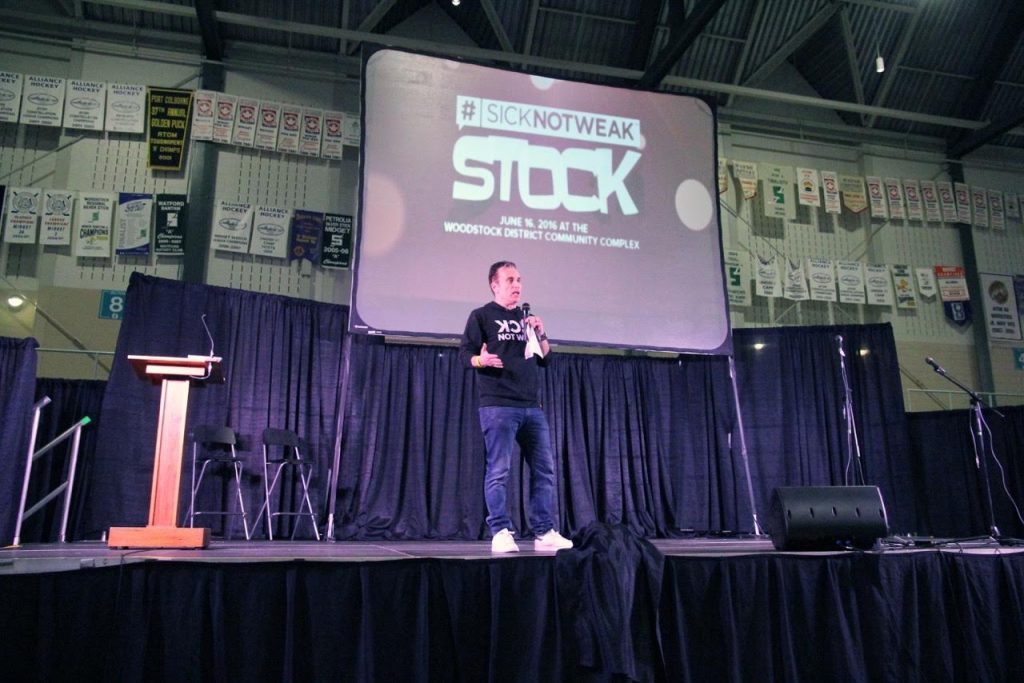
28 Sep An Interview With Michael Landsberg: #SickNotWeak
Michael Landsberg has been entertaining Canadian sports fans for over 18 years on TSN’s Off the Record. What his fans never knew, was that behind his no-holds-barred brash debating style, Michael was silently suffering with a long history of depression & anxiety. He started to talk publicly about his own struggles with mental health in 2010, and in 2013 produced an eye opening documentary titled Darkness and Hope: Depression, Sports and Me. Michael is an ambassador of Bell’s Let’s Talk campaign, and in 2015 he received the Humanitarian Award from the Canadian Screen Awards. His proudest achievement to date, came in 2016 when he launched his #SickNotWeak campaign and web site. The mandate for #SickNotWeak is to create a community of both those who have mental health issues and those that care for them + to end the stigma surrounding mental health.
Wise Women Canada: When did you first realize you were struggling with depression and anxiety?
Michael Landsberg: “My earliest memories include anxiety. I had fears that I was to embarrassed to talk about. I didn’t share them with anyone. I think because I hid my anxieties—perhaps it was then that I learned how to wear the mask and convince people I was fine. That mask allowed me to do TV while struggling with severe depression. I first felt depression 18 years ago. I was shocked by how devastating it was, how severe it was and how desperate I was for relief.”
WWC: Can you go into detail about what some of the earliest anxieties you experienced, how did they manifest themselves and what coping mechanisms did you put into play as a young child.
ML: “When I was a kid I feared some things that I knew no one else feared.” (It’s actually a common childhood anxiety! *Lisa Brookman) “I was petrified of being around anyone who threw up. I was petrified being around anyone who might throw up, could throw up, did throw up. It prevented me from doing anything that involved being on a bus. But other than that I just sucked it up and freaked out internally, while showing an outward calm. Apparently I learned at an early age the usefulness of wearing ‘the mask.’”
WWC: On that note, what would your advice be to parents who have young children who are suffering from mental illness?
ML: #1. “Acknowledge the fact that if you haven’t felt the illness your child is suffering from—you can’t possibly understand it. Acknowledging that is critical because the advice the [non-suffering] parent gives to the child is based on ignorance and wishful thinking and neither is a good basis for caregiving.”
#2. “Lessen guilt. Kids want to please their parents and suffering from a serious illness can make anyone feel guilty. You need to say ‘I don’t expect you to act. Please just be you—whatever that means.’”

WWC: Can you also describe some of the symptoms you experienced with depression. Can you detail your journey towards getting help?
ML: “By far the most profound symptom I felt was the loss of the ability to experience joy. I would wake up in the morning and [still do] with absolute certainty that I would feel no joy that day because depression had robbed me of that ability. My journey to getting help for depression was made much easier for me because I knew what I was suffering from. I saw my family Doctor, then saw a psychiatrist and said, ‘I’m not going to tell you how to do your job, but I can tell you right now I am suffering from severe depression, and I need to leave with a prescription.’”
WWC: What are some tools you use to manage your mental health?
ML: “Medication has been a crucial tool in my battle. I also take inventory regularly of how I feel, how long a relapse lasts for, what triggers may exist etc. I believe it’s crucial to understand yourself to manage an illness that can otherwise overwhelm you.”
WWC: How does having a mental health issue impact your relationships? Spouse, friendships? How does it impact your parenting? Are there any pluses that you see as well?
ML: “Depression changes us. And because of this, depression affects almost every relationship. I have learned that the best way to minimize the effects of mental illness on a relationship is to be totally open. What spouse wouldn’t feel abandoned emotionally if their spouse had retreated into depression’s hole and not explained why they’ve changed? I have shared my struggles with my family and friends since the beginning. Because of that I believe most of my relationships have bent to adapt to me and have luckily never broken.”
WWC: Who has been your greatest support during this journey?
ML: “I would say my family for sure. They have lessened my guilt by not expecting me to be me when I’m no well. And fellow sufferers who make me feel less isolated. Even though I spend much of my time talking about the illness to help others, I also spend time listening.
WWC: What are the gifts of having a mental illness? Heightened sensitivity? Creativity?
“[IMHO]Mental illness directly gives us little. But by extension it can give us some positives. If we are given back our mental health we often cherish it for life. Until something is taken away—you take it for granted. I don’t celebrate my ability to walk, but if it was taken away and then returned I would appreciate every step I could take. Similarly, I celebrate my mental health every day I feel like it is intact! Mental illness has given me the chance to impact lives. I can use the poison inside me to be someone else’s medicine. I feel like by sharing my story as openly and candidly as possible I have made a difference in the lives of some others. Hearing the words “you saved my life because you shared” is a blessing I can’t even put into words. Depression has been the worst thing I have ever experienced, but on a good day I can honestly say it has also been one of the best.
WWC: Can you tell us about some of the important work #SickNotWeak has been doing?
ML: #SickNotWeak has a basic mission: “To change people’s belief that mental illness is a sickness and not a weakness” We do that by getting strong people to share their own stories of struggle. I say these words all the time in as many different venues as possible. “I suffer from depression. I am not ashamed, not embarrassed and I am not weak.” I say those words loud and clear without a hint of guilt. That’s WHAT #SickNotWeak does. And over the past 6 months we have changed lives by giving others the strength to share their own struggles.
WWC: Most gratifying part of your work?
ML: “Most gratifying are the messages that say ‘#SickNotWeak changed my life.’”
WWC: We see that your dog ‘Brando’ is the #SickNotWeak ambassador. Can you tell us how having a pet has helped to heal your mental health issues and why having a pet can help?
ML: “A pet has the tools to be the perfect partner in a battle with mental illness.”
*Pets don’t judge and make us feel weak.
*Pets don’t make suggestions that minimize our illness.
*Pets allow us to take off the mask and just act how we want.
*Pets giving us love regardless of our ability to give them love.
*Pets often instinctively know when we need a boost.
*Pets show love by taking love. They offer themselves to us when we need them most.
WWC: Do you have any initiatives planned for World Mental Health Day on October 10th, 2016?
ML: World Mental Health Day is every day for #SickNotWeak.
WWC: What is your greatest strength?
ML: “In the area of mental health—my greatest strength is my candor. I am willing to share everything I’ve got and that makes me effective in my role. I don’t just ‘say’ I have an illness—I also say what it **feels** like and what it does to me.
WWC: How can people start the conversation about mental health?
ML: “The conversation begins when people feel like they can share without shame or embarrassment. The most powerful thing anyone can say in a room is ‘I don’t see mental illness as a weakness.’ It is exactly the same as any other illness. People are not to blame for their illness.”
WWC: Do you think we will ever stop the stigma?
ML: “Will we ever get rid of racism? Likely not. But reducing racism is a victory. Reducing the stigma is the goal.”
WWC: And finally Michael Landsberg, what’s your favourite quote?
ML: “‘Of the people by the people, for the people.’~Abraham Lincoln in the Getesyburg address. I want it to apply to #SickNotWeak: an initiative of, by and for the people!”
***




No Comments